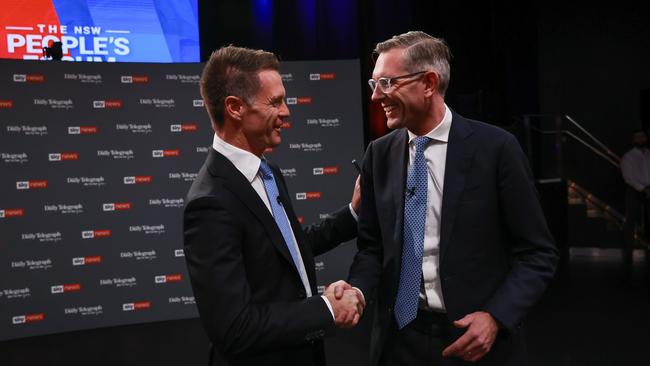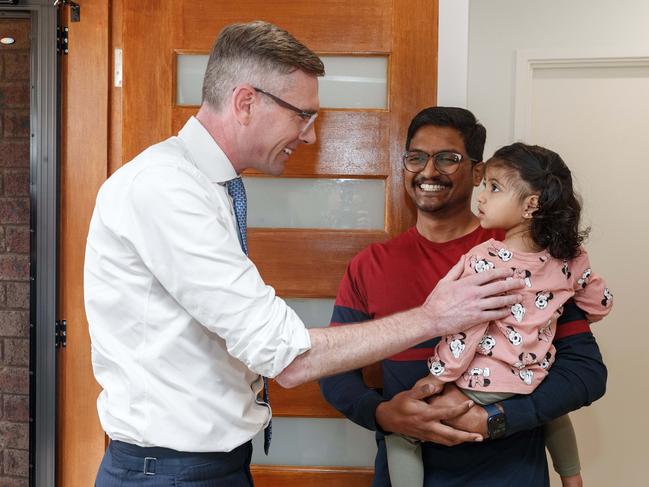NSW election: ghosts of past scandals shape bland campaign
Two 40-something leaders wax lyrical about how much they admire each other as fathers while banking on collective voter amnesia.

While the respective leaders are the biggest strengths the major parties have to offer, this has been an election lacking in big-picture vision for Australia’s biggest state and a campaign free of dramatic moments, fiery clashes, stumbles and gaffes. It is anything but inspiring or entertaining.
With such a bland campaign and leaders handing each other bouquets rather than brickbats, it is no surprise there has been a high level of disengagement and many undecided voters. Where is the spirited contest between incumbent and challenger that often has defined previous state and federal elections? Instead, Perrottet and Minns have sought to make a virtue of their friendship and respect for each other.
The two 40-something leaders avoid personal attacks and instead wax lyrical about how much they admire the other as a father, husband and all-round good guy. It is so civil that it is almost nauseating.
In this top-down, leadership-focused campaign, the Liberal and Labor parties are hoping the spotlight on them means voters forget the recent histories of their parties. They are banking on collective voter amnesia. The last thing they want voters to think of before casting their ballots is their smiling faces on corflute signs.
Anyone remember premier Gladys Berejiklian resigning over ethical and probity breaches by not declaring her relationship with disgraced MP Daryl Maguire? That Independent Commission Against Corruption investigation has not reported but former NSW premier Mike Baird conceded the personal relationship should have been divulged in accordance with the ministerial code of conduct.
Berejiklian’s fall from power is not the only scandal that has plagued this government, elected on a promise to clean up NSW politics after the corrupted Keneally government was dispatched with brutal efficiency by the voters in 2011. The first major scalp was premier Barry O’Farrell, who unintentionally misled ICAC over the gift of a bottle of wine. Then 10 MPs were embroiled in a donations scandal. More recently, minister Gareth Ward was stood aside for alleged sexual violence offences, which he denies. Nationals MP Michael Johnsen resigned from parliament after being accused of raping a sex worker, an allegation he also denies.
Beyond the imputations of sleaze, there are corruption findings against former minister John Sidoti regarding land purchases and rezonings, which he too denies. Minister Eleni Petinos was sacked after bullying claims surfaced. A series of scandals involving former Nationals leader and deputy premier John Barilaro include his appointment as trade commissioner to New York – which also led to minister Stuart Ayres resigning – and the allocation of bushfire recovery grants. Barilaro denies any impropriety. Finance minister Damien Tudehope resigned from cabinet when it was revealed he did not disclose holding shares in toll road owner Transurban.
Perrottet is the fourth Liberal premier since the government came to office in 2011. O’Farrell is now a diplomat and strictly non-partisan. Baird is back in the private sector and rarely intervenes in politics. And Berejiklian has all but disappeared apart from one brief campaign appearance in Penrith.
Since he became Premier in 2021, Perrottet has sought to steady an often divided and dysfunctional government. Scandals that forced MPs to the crossbench and the loss of the seat of Bega to Labor last year mean he is defending a minority government seeking a fourth term. While the Nationals held Barilaro’s seat of Monaro at a by-election, Berejiklian’s safe seat of Willoughby was almost lost to an independent. But Perrottet has impressed as Premier. His cashless gaming card is the only brave policy in this campaign. (Labor favours a poker machine trial.) He has pitched for the votes of young first-home buyers by replacing stamp duty with land tax, and went after the aspirational vote with child savings accounts with parental contributions matched by the government. He trumpets an impressive delivery of road and rail infrastructure projects.

Despite suggestions his conservative Catholic faith could unsettle voters, he has been nothing but progressive on a range of issues from supporting IVF and universal pre-kindergarten to climate change and Indigenous reconciliation. He showed wise judgment in not attending Cardinal George Pell’s funeral. His admission of and apology for wearing a Nazi uniform at his 21st birthday party won him only respect.
In the final days of the campaign, Perrottet returned to core Liberal themes, arguing Minns was inexperienced, could not responsibly manage budget finances and there was a hole in Labor’s policy costings. Energy and toll rebates and parent vouchers are designed to alleviate cost-of-living pressures.
Perrottet’s handicap is longevity and perception that the government’s best days are behind it. He has struggled to counter the time-for-change sentiment. Five serving or former ministers are quitting parliament: Brad Hazzard, Rob Stokes, Victor Dominello, Geoff Lee and factional bomb-thrower David Elliott. Perrottet, obstructed by party factionalism, has failed to substantially lift representation of women in Liberal parliamentary ranks.
Labor has had five leaders since Kristina Keneally’s government was bundled out of office. When Minns became leader in 2021, he overhauled Labor’s lifeless frontbench. His “executive leadership team” comprises deputy Prue Car, upper house leaders Penny Sharpe and John Graham, shadow treasurer Daniel Mookhey and frontbenchers Jo Haylen and Ryan Park. Talent does not run deep; not surprisingly, shadow ministers outside the super six have been missing in action. Only former leader Michael Daley on the frontbench has ministerial experience.
On becoming leader, Minns shrewdly offered bipartisanship during the pandemic and focused his fire on the many integrity scandals. While he presents as a fresh-faced, suburban husband and father, and next-generation leader, he has been badly let down by the party’s campaign preparations and execution. Bob Nanva, soon to be an upper house MP, has been a disastrous party secretary. He did not finalise preselections in key seats until weeks ago, several candidates were forced to resign, the party is starved of funds and even basic campaign functions seem too difficult. If Labor does eke out a victory it will be overwhelmingly due to Minns rather than Nanva.
Labor’s primary pledge is not to privatise government assets. Minns promises to reduce the toll burden for motorists, revitalise manufacturing and abolish the public sector wage cap. The introduction of staff-patient hospital ratios, which Minns ruled out just weeks ago, is now a Labor guarantee. The opposition is also promising to lift school standards and reduce class sizes, improve public transport and reduce hospital emergency department waiting times. Labor will scrap stamp duty for homes worth up to $800,000, strengthen renter rights and invest in social housing.

It resembles Anthony Albanese’s “safe change” mantra that delivered a modest federal election win last May. In other words, Minns is prosecuting a small-target strategy. The risk is that it resembles a 1970s-style populist Labor campaign, reflecting the dominance of the vanishing union movement, and will not be enough to excite voters. But Minns is the drawcard for Labor, not policy.
While Minns has given superior debate performances against Perrottet, he lacks the no-holds-barred energy and dynamism of Labor’s most successful post-war leaders, Neville Wran and Bob Carr. Minns, as he conceded in a recent interview with Inquirer, does not like talking about himself. Yet his relaxed style should not be mistaken for lack of ambition or determination, and his standing has lifted with voters.
For all the renovation of Labor, the promise of “fresh leadership” and a “fresh-start plan”, memories of the party’s past haunt the campaign. Everybody knows of Eddie Obeid. Several ministers and MPs in the Keneally government were found to have acted corruptly by ICAC. Former leader Luke Foley was forced to resign after being accused of sexual harassment. Two party secretaries – Jamie Clements and Kaila Murnain – also resigned in scandal.
Political leaders always have an eye to history. No Liberal leader has won a fourth four-year term before. (Liberal leader Bob Askin won four elections – 1965, 1968, 1971, 1973 – before the introduction of four-year terms.) Moreover, the Coalition has never been in power for this long before. Perrottet would be a miracle worker if his government won re-election.
Labor was once utterly dominant in NSW politics but its electoral victories, on gaining government, have often been narrow. Bill McKell led Labor to power in 1941 with an 18-seat majority and the party remained in office until 1965.
But Wran took Labor from opposition into government in 1976 with a one-seat majority. In 1995, Carr also won with a one-seat majority. If momentum continues to run with Minns, he will join the pantheon of Labor heroes.
In the final analysis, Labor is more likely to be in a position to form a minority or majority government. Minns has elevated Labor to an election-winning position for the first time since 2011.
Forty-seven lower house seats are required for majority government. The Coalition is already in minority. Labor needs to win nine seats to secure government on its own. This would require a uniform swing of 6.5 per cent, which is unlikely. Labor could gain four or five seats and form a government with the support of the three Greens MPs and several independents.
There are more pathways to power for Minns. Labor would gain Parramatta (6.5 per cent margin), Winston Hills (5.7), Riverstone (6.2), Ryde (8.9), Drummoyne (13.6) and regional Monaro (11.6) if voting at the federal election last year were replicated. However, seats Labor needs to win, such as East Hills (0.1 per cent), Penrith (0.6), Holsworthy (6.0) and Oatley (6.8), would be won by the Liberals on recent federal voting patterns.
The Coalition’s longevity and accumulated baggage – revolving-door premiership, scandals and sleaze, and ministerial resignations – mean Perrottet’s chances of victory are slim. The Liberals also will have to contend with teal challenges in a half-dozen wealthy, leafy, north-of-the-harbour seats. Yet optional preferential voting along with donation and spending caps will make teal victories difficult.
If the Coalition loses, Perrottet is likely to quit parliament and hand the Liberal leadership to his deputy, Treasurer Matt Kean.
If Perrottet wins, few expect he will remain premier full-term and will eye an exit in a few years. He never envisaged a long parliamentary career.
If Labor fails to win the election, Minns will hold on to the opposition leadership but must engage in a thorough campaign post-mortem and steel himself for four more years out of power. If Minns loses his marginal seat of Kogarah, held by just 0.1 per cent, the most capable Labor MP to succeed him is Park.
Much is at stake, as ever, for both Minns and Perrottet on Saturday. With leadership the premier issue in the election campaign, both will be closely judged on the seat scorecard. Perrottet is more popular and Minns is less well known. The voters’ verdict may come down to who they personally like best or dislike least.
.




As NSW voters go to the polls on Saturday, the Coalition and Labor are both running presidential-style campaigns showcasing Premier Dominic Perrottet and Opposition Leader Chris Minns, eager to avoid the ghosts of past scandals and their lacklustre frontbenches, and have pursued a largely risk-averse approach to policy.